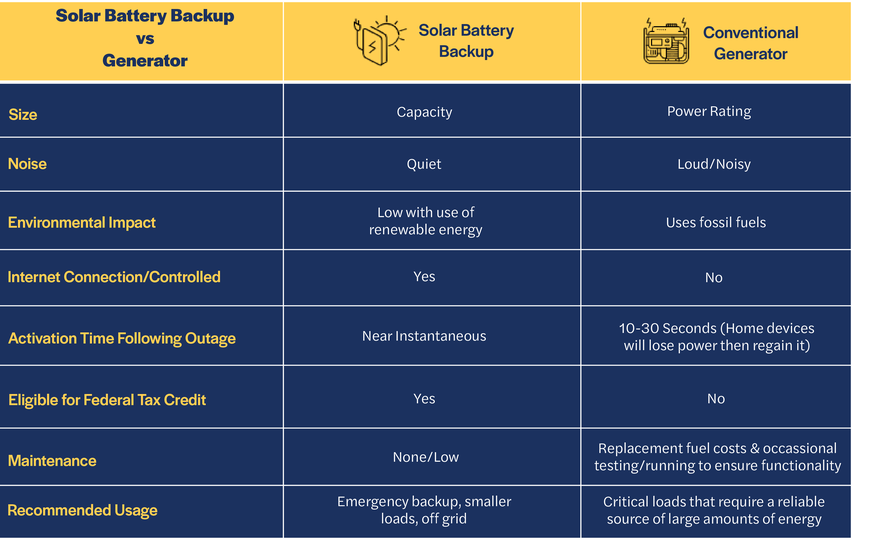Sept. 16, 2021
Solar Battery Backup VS Generators
By Hayley Walker

Backup power supply for your home or business provides the confidence and assurance that you can weather any setback. Whether it is an unexpected grid outage or simply wanting full control over your energy supply, power backup grants you the energy independence to determine how and when you utilize electricity.
The benefits of backup energy storage for your home or business include;
- Keeping the lights on
- Keeping refrigerators and freezers running to prevent food spoilage
- Keeping critical medical equipment powered
- Allowing you to work from home on a laptop or computer or keep your business open
Home and business power backup comes in two main forms, battery backup and generators. While both forms of backup power strive to achieve a similar outcome, the means through which they arrive at that outcome are quite different, especially if you are looking to pair your backup with a solar energy system. Understanding the differences between solar battery backup and generators can help you make an informed decision about which option ultimately suits and meets your energy goals.
Solar Battery Backup
Battery backup that runs off of a solar energy system means backup power for your home or business is generated by the sun and stored in batteries until you are ready or need to tap into it. You are not relying on the grid to recharge your batteries but rather you are utilizing a free, renewable energy source. Even when the grid is down, your solar power system can continue to feed energy to your backup battery as long as it’s sunny out.
Solar battery backup most commonly utilizes lithium-ion batteries which are the most environmentally friendly option for backup power available. While the initial cost for batteries can be higher than a generator, solar batteries ultimately save money over the long term. Their use of renewable energy and rare maintenance requirements provide a low fuss, reliable solution for backup power. They are generally much quieter than generators too.
Generators
Generators, for the most part, require a fuel source to operate. This fuel source is usually a fossil fuel, like diesel, liquid propane, or natural gas which then gets converted by the generator into electricity for your home. While generators can provide a reliable source of backup power, they do necessitate having a fuel source on hand to keep them running and will emit carbon dioxide and other greenhouse gases that contribute to global warming and negative climate change.
Generally much louder than batteries, conventional generators, with their moving parts, do tend to require replacement sooner than lithium-Ion batteries. They also require more maintenance than solar batteries and need to be turned on and tested regularly to keep them operational. While generators are relatively cheap to purchase upfront, keep in mind the accumulating cost of having to fuel it over time.
A generator can maintain large loads for long periods of time as long as you have the fuel on hand to keep it running. It can be a convenient option if your home or business is near a natural gas line or if you are unable to install a solar energy system.
Overall, solar with battery backup can provide more energy independence, longevity, and a source of sustainable clean power than a generator. While the initial investment may feel more expensive than a generator, solar battery backup pays off over the long run.
Solar Battery Backup Compared to Generators
